|
|
|
Sort Order |
|
|
|
Items / Page
|
|
|
|
|
|
|
| Srl | Item |
| 1 |
ID:
155070
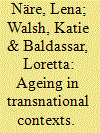

|
|
|
|
|
| Summary/Abstract |
This Special Issue on ‘Ageing in Transnational Contexts: Transforming Everyday Practices and Identities in Later Life’ extends our understanding of how ageing is experienced in transnational contexts. It focuses on how everyday lives and identities in older age are being negotiated by individuals who have migration histories or who are affected by the mobilities of others in their lives. In the introduction, we situate our approach within an emerging strand of research investigating the inter-related processes of ageing and transnational migration. We also present the seven empirical case studies that constitute the issue and discuss their collective contribution for the research field.
|
|
|
|
|
|
|
|
|
|
|
|
|
|
|
|
| 2 |
ID:
166892
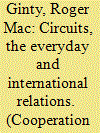

|
|
|
|
|
| Summary/Abstract |
The primary aim of this article is methodological. It proposes circuitry as an analytical device – not a mere metaphor – as a way of connecting the everyday and the hyper-local to the national, international, transnational and all levels in between. Thus, the article is concerned with international relations’ perennial levels of analysis problem. The study is prompted by empirical research from the Everyday Peace Indicators project in which research subjects narrated their own (in)security in terms of the home and the immediate vicinity of the home. The home can be regarded as a key part of everyday and ontological security for many people, but how do we connect this to the international and transnational? The article draws on the literature on engineered and biological circuits in order to propose a novel analytical device with which to emphasise the connectivity between apparently unconnected levels. A life history is used to illustrate how the analytical device might be operationalised.
|
|
|
|
|
|
|
|
|
|
|
|
|
|
|
|
| 3 |
ID:
166894
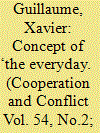

|
|
|
|
|
| Summary/Abstract |
Against the background of a continuing interest in the everyday in international relations, this article asks what kind of analytics upon and within the world mobilises one through the concept of the everyday and what consequences this may have for thinking about politics. In particular, it explores a conception of the the everyday that foregrounds the abundance of human life and ephemeral temporalities. The abundance of life invites a densification of politics combined with an emphasis on displacing levels or scales by associative horizontal relations. The ephemeral introduces a conception of temporality that foregrounds the political significance of fleeting practices and the emergent nature of life. When applied to politics, this conception of the everyday performs politics as emergent, as possibilities that are not already defined by fixing what politics can possibly be. The order of politics is then understood as an immanently precarious succession of situations and practices in which lived political lives remain inherently aleatory, momentary and emergent rather than as an order of mastering the political. The concept of the everyday, thus draws attention to the immanent elusiveness and fragility of politics as it loses its ground, its referent.
|
|
|
|
|
|
|
|
|
|
|
|
|
|
|
|
| 4 |
ID:
175362
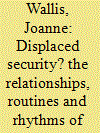

|
|
|
|
|
| Summary/Abstract |
This article considers what treating individual international interveners engaged in peacebuilding work as referent objects can tell us about emplaced security. This is important because individual interveners are diverse, embodied agents who can impact the agency, peace and security of conflict-affected populations. It argues that applying an ontological security lens can provide a partial explanation for why interveners develop narratives and perform practices, including why they sometimes identify and behave in counterproductive, and even damaging, ways. The final section considers why an analytical focus on place is valuable, noting that place-based experiences and place-identities are formative of ontological security. It argues that treating interveners as a referent object provides opportunities to rethink the tendency to focus on home as the key site of emplacement in the ontological security literature. Building on this, it argues that examining the emplaced security of interveners invites us to examine the political nature and consequences of interveners’ physical and ontological security-seeking narratives and practices, including their creation of the material and ideational structures of intervention spaces and places.
|
|
|
|
|
|
|
|
|
|
|
|
|
|
|
|
| 5 |
ID:
139424
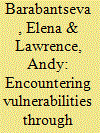

|
|
|
|
|
| Summary/Abstract |
In this article we discuss the potential of observational and participatory filmmaking methods to both explore and represent a research subject through a documentary film. We position our project ‘British Born Chinese’ about the experiences of the second generation of Chinese migrants in relation to other recent audio-visual interventions in IR, and present our methodological approach of observational and dialogical engagement with participants and the ethics of representation related to it. In doing this, we explore the potential of audio-visual research to go beyond identity-based forms of inquiries concerning, in particular, migrant and diasporic experiences. Our aim is to develop a situated and contextualised understanding of how and under what conditions individuals resort to racialised forms of belonging. We consider the promise and limitations of observational filmmaking to depart from the structures of representation to evoke alternative solidarities around vulnerability.
|
|
|
|
|
|
|
|
|
|
|
|
|
|
|
|
| 6 |
ID:
193234
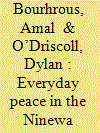

|
|
|
|
|
| Summary/Abstract |
Although the need for local ownership of peacebuilding is routinely emphasized, the importance and the modalities of engaging with local cultures and traditions are not adequately understood, and the peacebuilding potential of local customs remains largely unharnessed. Drawing on extensive interviews with community leaders (n94) and farmers and villagers (n107), and using a conceptual framework that combines notions of the everyday and events that mark a rupture with the everyday, this article explores the opportunities that local people’s everyday interactions, culture, and traditions offer for peacebuilding in post-Islamic State Ninewa Plains, Iraq. In doing so, the article makes a theoretical contribution to the everyday peace literature by further developing existing typologies of everyday acts and attitudes of everyday peace. Demonstrating how everyday acts and attitudes of peace sit on a scale with negative peace on the one end and positive peace on the other, the article introduces the concept of ‘affinity’ on the positive peace side of the scale, to refer to an affective engagement with the other and to acts of getting to know, understand, and participate in what is important to the other community.
|
|
|
|
|
|
|
|
|
|
|
|
|
|
|
|
| 7 |
ID:
177753
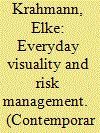

|
|
|
|
|
| Summary/Abstract |
Visuality is a central aspect of everyday security governance. In the recent visual turn in International Relations, however, the more mundane and routine visualities of security have been widely neglected. To address this gap, this article proposes a framework for analyzing the messages of security and risk conveyed by different modes of visual representations, ranging from press photos and educational images to outwardly appearances. Taking the United Nations Organization Stabilization Mission in the Democratic Republic of the Congo (MONUSCO) as an example, it shows that everyday visual representations reflect and contribute to security risk management in four ways: (1) They assist in the construction of self and other identities with regard to security, (2) they help to identify potential vulnerabilities, (3) they are used to educate people how to detect, assess, and behave in risky situations, and (4) they are employed to deter violent attacks.
|
|
|
|
|
|
|
|
|
|
|
|
|
|
|
|
| 8 |
ID:
119999
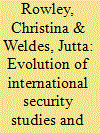

|
|
|
|
|
| Publication |
2012.
|
| Summary/Abstract |
Security studies is again reflecting on its origins and debating how best to study in/security. In this article, we interrogate the contemporary evolutionary narrative about (international) security studies. We unpack the myth's components and argue that it restricts the empirical focus of (international) security studies, limits its analytical insights, and constrains the sorts of interlocutors with whom it engages. We then argue that these limitations can at least partially be remedied by examining the performance of identities and in/securities in everyday life. In order initially to establish the important similarities between (international) security studies and the everyday, we trace elements of the evolutionary myth in Buffy the Vampire Slayer and Angel - which both stand in for, and are, the everyday in our analysis. We then argue that the Buffyverse offers a complex understanding of (identities and) in/security as a terrain of everyday theorizing, negotiation and contestation - what we call the 'entanglement' of in/security discourses - that overcomes the shortcomings of (international) security studies and its myth, providing insights fruitful for the study of in/security. In conclusion, we briefly draw out the implications of our analysis for potential directions in (international) security studies scholarship and pedagogy.
|
|
|
|
|
|
|
|
|
|
|
|
|
|
|
|
| 9 |
ID:
164975
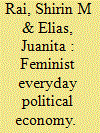

|
|
|
|
|
| Summary/Abstract |
It goes without saying that feminist International Political Economy (IPE) is concerned in one way or another with the everyday – conceptualised as both a site of political struggle and a site within which social relations are (re)produced and governed. Given the longstanding grounding of feminist research in everyday gendered experiences, many would ask: Why do we need an explicit feminist theorisation of the everyday? After all, notions of everyday life and everyday political struggle infuse feminist analysis. This article seeks to interrogate the concept of the everyday – questioning prevalent understandings of the everyday and asking whether there is analytical and conceptual utility to be gained in articulating a specifically feminist understanding of it. We argue that a feminist political economy of the everyday can be developed in ways that push theorisations of social reproduction in new directions. We suggest that one way to do this is through the recognition that social reproduction is the everyday alongside a three-part theorisation of space, time, and violence (STV). It is an approach that we feel can play an important role in keeping IPE honest – that is, one that recognises how important gendered structures of everyday power and agency are to the conduct of everyday life within global capitalism.
|
|
|
|
|
|
|
|
|
|
|
|
|
|
|
|
| 10 |
ID:
119170
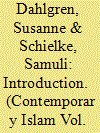

|
|
|
| 11 |
ID:
157919
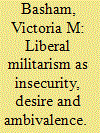

|
|
|
|
|
| Summary/Abstract |
The use and maintenance of military force as a means of achieving security makes the identity and continued existence of states as legitimate protectors of populations intelligible. In liberal democracies, however, where individual freedom is the condition of existence, citizens have to be motivated to cede some of that freedom in exchange for security. Accordingly, liberal militarism becomes possible only when military action and preparedness become meaningful responses to threats posed to the social body, not just the state, meaning that it relies on co-constitutive practices of the geopolitical and the everyday. Through a feminist discursive analysis of British airstrikes in Syria and attendant debates on Syrian refugees, I examine how liberal militarism is animated through these co-constitutive sites, with differential effects. Paying particular attention to gender and race, I argue that militarism is an outcome of social practices characterized as much by everyday desires and ambivalence as by fear and bellicosity. Moreover, I aim to show how the diffuse and often uneven effects produced by liberal militarism actually make many liberal subjects less secure. I suggest therefore that despite the claims of liberal states that military power provides security, for many militarism is insecurity.
|
|
|
|
|
|
|
|
|
|
|
|
|
|
|
|
| 12 |
ID:
178040
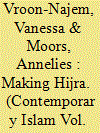

|
|
|
|
|
| Summary/Abstract |
Drawing on long term research – including topical life stories, interviews and participant observation – we analyze how women converts to Islam in the Netherlands signify and experience making hijra. Our interlocutors, all observant Muslims, had left the Netherlands between the late 1990s and the mid 2010s. In the course of the last 5 years many have again returned to the Netherlands. Their life courses indicate that physical and existential mobility are interconnected in their everyday lives as well as in their migration trajectories. Whereas they considered conversion to Islam as moving forward, the majority society did not share this perspective. They were sharply aware of how they were no longer seen as self-evidently part of the Dutch nation. This produced feelings of stuckedness - in an existential and a material sense - for themselves and their children, and hence a desire to move to a Muslim majority country. They differed amongst themselves as to whether and how they signified leaving Europe as making hijra in an Islamic sense. To some, making hijra was a highly desirable religious act. Others did not foreground such religious signification, but nonetheless expected positive effects of living in an environment where Islam would be an integral part of daily life. Their attempts to settle in various Muslim majority countries were, however, often not successful. Material conditions made it difficult to enact their ethical aspirations, that included the moral and material wellbeing of others, especially their children. Moreover, their appreciation of the self-evident presence of Islam in the countries of settlement was tempered, first, by the tension between their quest for a reflexive, deculturalized Islam and the culturalized practices they encountered in their new environment, and second, by their growing awareness of how their sense of self was much more shaped by habitual ‘Dutch’ conventions than most of them had envisioned beforehand. As a result they were often unable to develop meaningful social relationships in their new environment. Eventually, almost all of them returned to the Netherlands.
|
|
|
|
|
|
|
|
|
|
|
|
|
|
|
|
| 13 |
ID:
119174
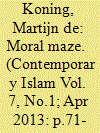

|
|
|
|
|
| Publication |
2013.
|
| Summary/Abstract |
The Salafi movement presents itself as a moral guardian of Muslims in a world that, according to many, is filled with moral crisis, temptations and anti-Islam tendencies. Salafis claim that it is essential to return to the community of the pious forefathers seen as the most outstanding community of all times with the highest absolute moral standard. In this article I will show how individual participants engage with this idea of a moral community of believers yet remain vulnerable to the ambiguities and ruptures inherent in everyday life and within the Salafi movement. By exploring how Salafis passionately try to search for the 'correct' knowledge and strive to maintain a unity between knowledge, conviction and behavior, and the role of friendships therein, I argue that Salafism does not remain separate from the troubles of everyday but that these issues enter into and exist in Salafi thought and practice, not by being resolved but by being transformed into personal struggles. These ambiguities and ruptures may cause problems but also provide an incentive for Salafis to continuously work at the self-improvement of one's piety, authenticity, and sisterhood and brotherhood.
|
|
|
|
|
|
|
|
|
|
|
|
|
|
|
|
| 14 |
ID:
102937
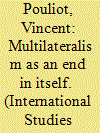

|
|
|
|
|
| Publication |
2011.
|
| Summary/Abstract |
Students and practitioners of world politics need to assess the value of multilateralism not only as a means to an end, but also as an end in and of itself. The functional view, according to which multilateral channels are worth pursuing only insofar as they allow actors to gain influence on the global stage or produce tangible and immediate results in fighting global harms, is incomplete. As a global governance practice characterized by an inclusive, institutionalized, and principled form of dialog, the multilateral procedure generates a number of processual benefits-mutually recognizable patterns of action, typically moderate solutions, and legitimate policies whose large ownership eases their effective implementation-which, taken together, strengthen the political impetus for global cooperation, regardless of the policies adopted. Routinized, nondiscriminatory, and comprehensive political dialog is a pragmatic template for enhancing global governance that can be implemented here and now, as recent developments at the United Nations indicate.
|
|
|
|
|
|
|
|
|
|
|
|
|
|
|
|
| 15 |
ID:
160451
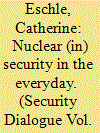

|
|
|
|
|
| Summary/Abstract |
This article extends the emergent focus on ‘the everyday’ in critical security studies to the topic of nuclear (in)security, through an empirical study of anti-nuclear peace activists understood as ‘everyday security practitioners’. In the first part of the article, I elaborate on the notion of everyday security practitioners, drawing particularly on feminist scholarship, while in the second I apply this framework to a case study of Faslane Peace Camp in Scotland. I show that campers emphasize the everyday insecurities of people living close to the state’s nuclear weapons, the blurred boundaries between ‘us’ and ‘them’, and the inevitability of insecurity in daily life. Moreover, campers’ security practices confront the everyday reproduction of nuclear weapons and prefigure alternative modes of everyday life. In so doing, I argue, they offer a distinctive challenge to dominant deterrence discourse, one that is not only politically significant, but also expands understanding of the everyday in critical security studies.
|
|
|
|
|
|
|
|
|
|
|
|
|
|
|
|
| 16 |
ID:
146656
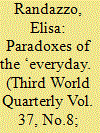

|
|
|
|
|
| Summary/Abstract |
With the advent of the local turn in the mid-2000s, critical approaches have attempted to rethink peace building from the bottom up, placing local agents at the centre of the debate, declaring the end of top-down governance and affirming the fragmented, complex and plural nature of the social milieu. While local turn approaches have become popular in peace-building theory, this article invites the reader to question and problematise the local turn’s use of the concept of ‘everyday’, in order to explore paradoxes and contradictions that indicate the need to think more deeply about the impact of the local turn’s project of critique.
|
|
|
|
|
|
|
|
|
|
|
|
|
|
|
|
| 17 |
ID:
178860
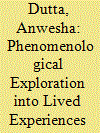

|
|
|
|
|
| Summary/Abstract |
The Bodoland Territorial Autonomous Districts (BTAD) in the state of Assam in Northeast India can be described as a landscape of terror since the area has been a stage for recurrent, mostly violent contestations along ethno-religious lines for more than four decades. Over the years, the violence has claimed more than a thousand lives and displaced millions. Using a multi-sited ethnography carried out over more than eleven months of fieldwork in the region, this paper looks at the everyday lives of those affected by the conflict and critiques the notion of spectacular resistance and exceptionalism in the context of Northeast India. This is done by using a phenomenology of lived experience framework to pay closer attention to the distinctly ordinary ways in which populations survive and endure states of dispossession, displacement and abandonment.
|
|
|
|
|
|
|
|
|
|
|
|
|
|
|
|
| 18 |
ID:
175531
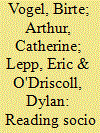

|
|
|
|
|
| Summary/Abstract |
This paper argues that graffiti can provide a form of socio-political commentary at the local level, and is a valuable, yet often overlooked, resource for scholars and policymakers in conflict-affected societies. Graffiti, in its many forms, can provide rich insight into societies, cultures, social issues, trends, political discourse, and spatial and territorial identities and claims. Thus, this, paper suggests that graffiti is a valuable source of knowledge in societies undergoing social and political transformation, to hear the voices of those often left out from the official discourses. Despite advances in the field of arts and international relations and the focus on the local and the everyday, peace and conflict scholarship and policy still lack systematic engagement with arts-based contributions and how to read them. The paper attempts to address this gap by outlining four core dimensions to consider when attempting to interpret and decode graffiti: the spatial, temporal, political economic and representative dimensions. This can also be viewed as an inquiry into the where, when, who and what. These four elements make up an analytical guide and enable scholars to better understand graffiti, and its political meaning and messaging.
|
|
|
|
|
|
|
|
|
|
|
|
|
|
|
|
| 19 |
ID:
119147
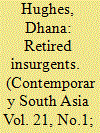

|
|
|
|
|
| Publication |
2013.
|
| Summary/Abstract |
This article explores the ways in which people who have perpetrated violence reformulate their lives and recreate sociality in the aftermath, through a focus on the narratives of former insurgents in Sri Lanka. It is anchored in a period of violence known as 'the Terror' (Bheeshanaya), which convulsed the southern and central regions of the country in the late 1980s. Attention is paid to how former insurgents go about recreating their social worlds in a post-terror context where 'perpetrators', 'victims', and 'witnesses' must live side-by-side in the absence of justice or reconciliation. This article suggests that for many 'perpetrators' of violence, rebuilding life in the aftermath is grounded in the mundane. The everyday that former insurgents must continually negotiate is saturated with the ethical charge of their past violence, which shapes sociality in the present in convoluted ways. Past violence and its complex moral evaluations linger beneath the everyday and surface unexpectedly under the most banal circumstances. Former insurgents reflexively put in place carefully thought-out strategies to re-create sociality and proactively attempt to manage the obstacles that their violent pasts may throw in the way of their ongoing attempts to reclaim their social worlds after terror.
|
|
|
|
|
|
|
|
|
|
|
|
|
|
|
|
| 20 |
ID:
166895
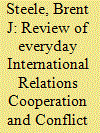

|
|
|
|
|
| Summary/Abstract |
The following include reviews of the special issue contributions, and in some cases reviews of the resubmissions.
|
|
|
|
|
|
|
|
|
|
|
|
|
|
|
|
|
|
|
|
|